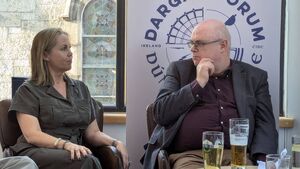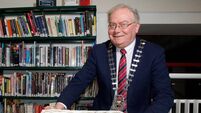Forum teases out the benefits of moving to Mayo

Liam Horan in conversation with Ballyheane native Michelle Rabbette, proprietor of the impressive Walters Bar and Venue in Dún Laoghaire which hosted an event to explore how to attract people and businesses to move to Co Mayo.
‘Why Choose Mayo?’ This was the topical subject of an interesting discussion held in Walters Bar & Venue, in Dún Laoghaire in Dublin, on Wednesday night last, July 3. Organised by the social enterprise, the Dargan Institute, the discussion explored why and how businesses and individuals might make the move to Mayo.
The evening attracted a great mix of attendees, with many from Mayo supplemented by many friends of the county. The discussion was skilfully moderated by Ballinrobe’s Liam Horan, and a range of contributors included Kilmaine’s Paraic Joyce, PRO of the Mayo Association Dublin; Stephen Carolan of Connected Hubs; Keith Guthrie, Mayo native and owner of Proprint, a successful print and design business based in Dún Laoghaire; and Michelle Rabbette from Ballyheane, the proprietor of the impressive Walters Bar & Venue.
This panel was assembled as part of the Dargan Forum, which is an annual event designed to explore how technology can play an empowering role in the green and digital transition taking place across Ireland. The Dargan Forum is named for and inspired by William Dargan, pioneer of railway technology and arguably Ireland’s most important engineer of the 19th century. The Forum channels William Dargan’s pioneering spirit by working to harness technology for human good and using it to connect people, places and ideas in new ways, just as Dargan himself did.
There were three main strands to the evening’s discussion, starting with a focus on the intersection of people and technology in a way that well reflected Dargan’s interests. It was pointed out that technology now provides far better opportunities for all sorts of people and enterprises to operate from Mayo, and the meeting heard from Stephen Carolan all about the importance of Connected Hubs, shared workplaces where businesses and individuals can work together in a modern business setting, and be supported to grow their businesses from their Mayo base.
These shared workplaces are very important to allow people to engage with like-minded professionals in a dynamic working environment. While working from home has of course its advantages, especially in the west, there was a recognition in the discussion that people also like to operate in a dynamic well-serviced busy office, with people who can empathise with the challenges of business and share good practice in all sorts of areas.
So there was a very welcome message from Stephen about the range of options for remote work provided by Mayo's hub network of 45 hubs. Stephen put focus on the importance of being able to recruit and retain ‘Location Managers’ for these connected hubs, people who have the skill set to both deliver what is needed for clients of the hubs in their business operations but also the right kind of supports to be able to help them grow their enterprises. Ensuring that such people can be recruited in a way that allows them to see career security and progression for themselves should be a key goal.
The second area of focus was on emphasising Mayo’s existing advantages, particularly as Dublin’s increasing congestion in every sense makes Mayo all the more appealing as a destination. Stimulated by Liam Horan, there were many good points made about what attracts people to Mayo and why they feel proud of the county. Time and again, respondents made reference to the quality of people, either in their pride, their warmth or their hard work and ingenuity. And all in attendance were agreed about Mayo’s other great strengths: stunning natural scenery and quality of life, as well as a growing enterprise support, a developing economic offer and business friendly infrastructure.
The third strand of the discussion was the type of infrastructure and social and economic environment that is needed to attract more people to come and live and work in the county. The need to develop our strategic infrastructure was also discussed, with the role of Ireland West Airport of course to the fore here, as well as the importance of energy and clean water for successful businesses of the future.
Alongside these three core areas, there was a lively discussion of how best to sell Mayo as a place to live and work to people in the capital that are at a transition point in their lives, be it in their next career move seeking a better work/life balance or with expanding families looking for a better quality of life or those that with family connections to Mayo that are interested in returning to their hometown. Networking is always key, and Paraic Joyce spoke about the work of the Mayo Association Dublin in making successful business connections between Dublin and Mayo, through initiatives such as the Mayo Association Dublin's annual Business lunch. The role of the Mayo diaspora in attracting business to Mayo and in advocating for it was especially emphasised, which was a point well made at a meeting in Dublin.
This expanded the discussion of networking and the possibility so many have now to split their working life between Dublin and Mayo, while being able to live in Mayo. The point was made repeatedly that ensuring more such people can choose Mayo as their place to live and as their primary place to work has all sorts of knock-on benefits for community, sporting and social organisations. It also means that the more of such people come, the easier it becomes to attract more such like-minded people – and that it was the definite view that much progress has been made on this since Covid, but that the opportunity arising needs to be built on. That also re-emphasised the importance of building social and cultural infrastructure in the west, the better to attract such people and their partners to come and make their life and not just their living in the region.
This can build upon our already well-deserved reputation for education facilities for our young people, as well as the need to continue to develop our adult education, skills, higher education and research agenda. The importance of Multinational Companies was mentioned – as was the thought that another large one would be very welcome.
The themes of both talking up our existing capacity as well as our need for development, which surfaced in the series of articles I wrote in the series, came up was discussed during the evening. Much done, and more to do – and a great gathering of those who can help to do it.
Further information about the work of the Dargan Institute can be found on www.darganinstitute.ie/





